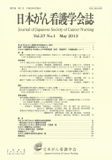Japanese
English
- 販売していません
- Abstract 文献概要
- 参考文献 Reference
- サイト内被引用 Cited by
要旨
本研究では,ホルモン療法を受ける乳がん患者の更年期症状の実態を明らかにし,ホルモン療法を受ける患者に対する看護支援のあり方を検討することを目的とした.調査は,無記名の自記式質問紙を用いた質問紙調査とし,郵送法で回収した.調査項目は,基礎情報,更年期症状(10項目),健康状態(9項目)であった.更年期症状の測定には,簡略更年期指数(Simplified Menopausal Index:SMI)を使用した.分析にはSPSSver. 18を用いて記述統計の後,ホルモン剤の種類および治療期間で更年期症状を,さらにSMIの重症度で健康状態を比較した.
質問紙は133名に配布し,83名から回答を得た(回収率62.4%).年齢は平均52.5(SD=8.4)歳,ホルモン療法の平均期間は24.7(SD=17.2)カ月であった.調査した10の更年期症状すべてにおいて出現率は50%を超えており,高頻度に症状が出現していることが明らかになった.重度の更年期症状が出現している者は20名(24.1%)おり,約4人に1人の割合で更年期症状に対する治療・ケアが必要であることが示された.また,重度の更年期症状が出現している場合には,健康状態に有意な差が認められた.ホルモン剤の治療期間では更年期症状に有意な差はなく,治療開始時から同様の症状が継続していた.重度の更年期症状の出現は,健康状態に影響を及ぼし,QOLを低下させる可能性がある.しかしながら実際には,更年期症状に対する治療・ケアを受けている者はおらず,重症度に応じたケアを行うことの必要性が示唆された.
Abstract
This study describes menopausal symptoms in breast cancer patients receiving hormonal therapy and discusses aspects regarding treatment and care for these symptoms. Self.administered anonymous questionnaires were mailed to 133 patients. Demographic information and data regarding menopausal symptoms and health states were collected. Menopausal symptoms were assessed using the Simplified Menopausal Index(SMI), a 10.item scale that assesses symptom severity. Total SMI scores range from 0(best)to 100(worst)and a score of >51 indicates that treatment and care are necessary. In addition, health states were assessed using a 9.item scale, with each item being rated from scores of 0(best)to 10(worst). After using descriptive statistics, menopausal symptoms were compared by the type of hormone preparations and duration of hormonal therapy. Health states were compared by the total SMI scores. SPSS ver. 18 was used for data analysis.
A total of 83 patients responded to the questionnaire(response rate 62.4 %). Their mean age was 52.5 years(SD=8.4 years)and the mean duration of hormonal therapy was 24.7 months(SD=17.2 months). More than half the patients experienced all menopausal symptoms. With regard to SMI, 63 patients(75.9 %)scored <50 and 20(24.1 %)scored ≧51; health states among patients scoring ≧ 51, tended to be worse than health states of those scoring <50. Total SMI score showed no significant difference with regard to the duration of hormonal therapy. Our study results showed that menopausal symptoms continued through the duration of hormonal therapy.
Among breast cancer patients receiving hormonal therapy, 1 in 4 required treatment and care for menopausal symptoms, and the health states in those patients were worse. However, in reality they received neither treatment nor care. Once hormonal therapy begins, breast cancer patients have to take medications for a long period. If menopausal symptoms are managed according to the severity during this time, patients' quality of life will improve.
Copyright © 2013, Japanese Society of Cancer Nursing All rights reserved.


